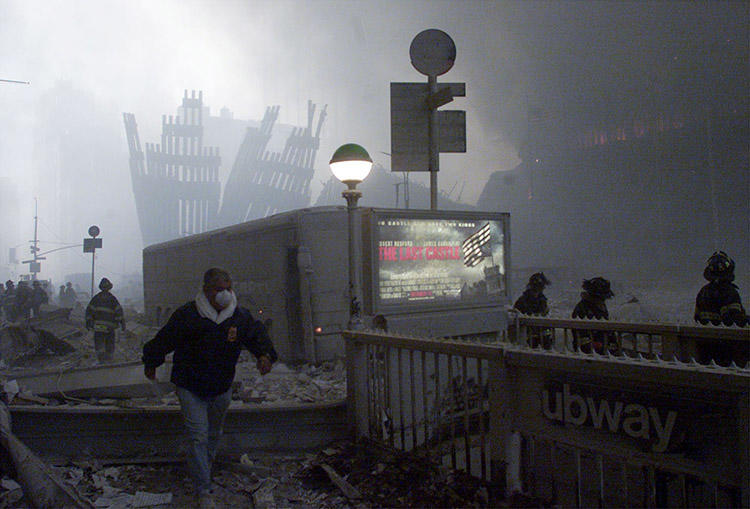Like the first responders who rushed to the World Trade Center on September 11, 2001, thoughts of personal safety were far from the minds of the journalists who covered the largest terror attack on U.S. soil.
In the aftermath of the attack, an estimated 91,000 liters of jet fuel and 10,000,000 tons of building materials and contents smouldered where the World Trade Centers used to stand, and a dust cloud hung over lower Manhattan.
On September 18—a week after the attacks—the Environmental Protection Agency said that the air was “safe” to breath, but it was later found that those at the scene were exposed to carcinogenic toxins, according to news reports. In a 2003 report, the agency’s inspector general said that the EPA did not have “sufficient data and analyses to make such a blanket statement” about the air quality.
Approximately 400,000 people were exposed to toxins at Ground Zero, according to reports. The Centers for Disease Control and Prevention, which has documented related medical conditions that include chronic rhinosinusitis, gastroesophageal reflux disease, asthma and cancers, estimates nearly 10,000 people have cancers related to the time they spent at Ground Zero.
In July, the Victim Compensation Fund that was set up to assist those who were injured or killed as a result of the attacks was extended. Michael Barasch, the managing attorney at Barasch & McGarry who represents 9/11 survivors and their families, has been alerting journalists and other survivors to the availability of programs that can help with healthcare costs.
The lawyer’s firm represents 55 journalists, including 71-year-old Vincent Novak, a video journalist who covered 9/11 from Ground Zero for NBC News and has been treated for a cancer that his oncologist dates to around the time of the terror attack.
Barasch told CPJ several programs offer help for journalists like Novak, including the World Trade Center Health Program, which provides free healthcare to those with 9/11 related illnesses and certifies the illnesses, and the separate Victim Compensation Fund, which offers compensation for treatment. (Under the law extending the fund, lawyers can charge up to 10 percent of their client’s compensation.)
In a Q&A with CPJ, Barasch and Novak talked about the assistance available and why journalists can—and should—make use of the healthcare support.
The interview has been edited for brevity and clarity.
Why do you think journalists might be hesitant to sign up for benefits?
Barasch: Many people have told me, including journalists, that they don’t want to make a claim and take the extra money, [saying] “Let the police and firefighters have it, they’re really the heroes, they’re the ones that were exposed the most.”
Now that the fund has been not only extended permanently, but fully funded, you’re not taking money away from anybody else.
Novak: As journalists, there’s a little bit of guilt that you’re not the first responder, you’re not going there to save lives, which is why the police and fireman went in, but we documented what they did. I think we did the public a service by showing what the police, firemen and EMT workers were doing that day and the week after. I think just because we were there and we got the same illness and took similar risks, there’s no reason why a journalist should feel any guilt for applying.
How can journalists or others prove that their illness is related to their work on 9/11?
Barasch: The [Fire Department of the City of New York] kept meticulous statistics of how many of its members used to get cancer. They know there is a 19-32 per cent increase in the number of cancers they are seeing in the same population. If the firefighters have this increase in cancer, so does everybody else and that’s the presumption that the WTC Health Program made.
You don’t have to prove that your cancer was caused, there’s a presumption that if you have a cancer that was diagnosed after a certain period of time, it was more likely than not caused by the toxic exposure.
Novak: Without having mentioned my participation at Ground Zero on 9/11, my oncologist told me in 2016 that the first cancer cell probably showed up 15 years prior. They’re specialists and they do the genomic testing that gives them a better insight into the timeline.
During my time at NBC News, I’ve been to several wars, El Salvador, the Middle East, and I’ve covered a lot of natural disasters including forest fires. We’d always take precautions going into these places, so you’re taking a risk, but it’s a prudent risk. On 9/11, we were told by spokespeople from the EPA and FEMA that the air was safe to breathe. But that turned out to be [inaccurate]. I’ll be getting some money from the Victim Compensation Fund for my cancer, but I would gladly give that money back twice over in exchange for the cancer.
Why is it important for journalists to sign up for benefits or compensation?
Barasch: On 9/11, people were running from Ground Zero and the journalists were grabbing their cameras and their notebooks and rushing to the site. Everyone was so afraid there were going to be more attacks. Having them be able to report calmed everybody down. [Journalists] should be acknowledged and compensated for their work. More pragmatically, they shouldn’t pass up help to cover their healthcare.
Novak: On 9/11 and the days after, there was a lot of uncertainty about what was going to be next. There were a lot of uncertainties about whether there was going to be another attack and by being there and showing it live that day, I think we helped reduce the fear that a lot of people had. I think the media did a service.
It’s not that anybody wants to be thanked for doing their job, we just want to be acknowledged. For their family’s sake, I think people should look into [the healthcare and assistance programs].
